|
|
|
Sort Order |
|
|
|
Items / Page
|
|
|
|
|
|
|
| Srl | Item |
| 1 |
ID:
186160
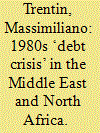

|
|
|
|
|
| Summary/Abstract |
The article reviews the positions and policies of Middle Eastern and North African states towards the external ‘debt crisis’ of the 1980s within the context of contemporary debates and negotiations held at regional and international levels. MENA countries shared many commonalities with their developing partners across the postcolonial world and participated actively in the debates within multilateral organizations, such as the United Nations Conference on Trade and Development (UNCTAD). Because standard borrowing in the MENA was public, bilateral and closely tied to politics, the article argues for the relevance of regional factors in shaping the course of the debt crisis in the MENA region, and challenges the common visions for which Western creditors could manage external debt as an effective ‘lever’ for introducing neoliberal policies: oil endowment, armed conflicts and alliances shaped the timing and results of the debt crisis in the MENA. The research is based on an extensive review of regional and international literature coupled with documents and proceedings from the UN organizations.
|
|
|
|
|
|
|
|
|
|
|
|
|
|
|
|
| 2 |
ID:
105948
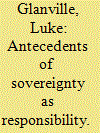

|
|
|
|
|
| Publication |
2011.
|
| Summary/Abstract |
Notions of 'sovereignty as responsibility' and 'the responsibility to protect' are often fra-med as radical departures from the 'traditional' conception of sovereignty. Many assume that sovereignty has, until recently, entailed only rights and not responsibilities. In con-trast, this article argues that sovereign authority has been understood to involve varied and evolving responsibilities since it was first articulated in the 16th and 17th centuries. It then traces the historical emergence of the tension between the right of sovereign states to be self-governing and free from outside interference and their responsibility to secure the safety of their populations. It cautions against a simplified story of 'traditional' sovereignty which reifies supposedly concrete and ahistorical rights of sovereigns while casting sovereign responsibilities as a morally abstract and late-arriving challenge.
|
|
|
|
|
|
|
|
|
|
|
|
|
|
|
|
| 3 |
ID:
087471
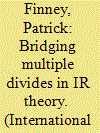

|
|
|
| 4 |
ID:
120424
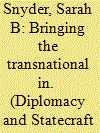

|
|
|
|
|
| Publication |
2013.
|
| Summary/Abstract |
One of the most interesting innovations in recent international history writing is the adoption of transnational approaches. This article echoes earlier calls for international historians to integrate transnational methods more fully into their work by highlighting the salience of human rights and influence of human rights activism as aspects that would otherwise be largely left out of the history of the Cold War. Such methodological innovation is essential to a deeper understanding of the Cold War.
|
|
|
|
|
|
|
|
|
|
|
|
|
|
|
|
| 5 |
ID:
165032
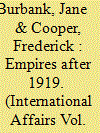

|
|
|
|
|
| Summary/Abstract |
1919 was not the death knell of empires: it opened new imperial possibilities. The empires of the losers were destroyed; victors added new territories and a new element—the mandate—to their repertoires; Japan was recognized as a major imperial actor; the Soviet Union constituted a new form of empire; Germany, chafing at its exclusion from the world of empires, created the Third Reich; the US, after promoting a new international order, developed its own way of exercising power at a distance. This article describes the varied trajectories of empires in the decades after the First World War. It notes changes in discourse and international institutions after 1919, but argues against fitting 1919 into a linear narrative of ‘empire to nation-state’. Self-determination proved a problematic concept both where it was implemented and where it was not. The forced breakup of the Ottoman Empire led to conflicts that have yet to be resolved. Anti-colonial movements fought oppression, but often sought alternatives to both old-style empires and the territorial state. Colonial empires were able to contain challenges, refine their methods of rule and claim international legitimacy. It took another catastrophe for colonial empires to be fundamentally threatened—by a war that was more the result of the reconfiguration of empires after 1919 than of their decline. The Japanese takeover of southeast Asia began the unraveling of European empires after 1945. Even then, political possibilities that reach well beyond the national continued to shape our world.
|
|
|
|
|
|
|
|
|
|
|
|
|
|
|
|
| 6 |
ID:
113805
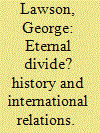

|
|
|
|
|
| Publication |
2012.
|
| Summary/Abstract |
On one level, history is used by all parts of the International Relations (IR) discipline. But lurking beneath the surface of IR's approach to history lies a well-entrenched binary. Whereas mainstream positions use history as a means to fill in their theoretical frames (seeing history as a kind of 'scripture' of abstract lessons), many post-positivists reduce history to a pick-and-mix of contingent hiccups (a 'butterfly' of what-ifs and maybes). Interestingly enough, this binary is one reproduced throughout the social sciences. As such, there is a bigger story to the apparently 'eternal divide' between history and social science than first meets the eye. This article uses the various ways in which history is used - and abused - in IR to probe more deeply into the relationship between history and social science as a whole. This exploration reveals four frameworks, two drawn from history (context and narrative) and two drawn from social science (eventfulness and ideal-typification) which illustrate the necessary co-implication of the two enterprises. The article employs these tools as a means of re-imagining the relationship between history and social science (including IR), conceiving this as a single intellectual journey in which both are permanently in view.
|
|
|
|
|
|
|
|
|
|
|
|
|
|
|
|
| 7 |
ID:
165036
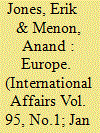

|
|
|
|
|
| Summary/Abstract |
European political development since the Treaty of Versailles has gone through four phases. The interwar period was a time of democratic weakness and ethnic conflict that culminated in the Second World War. What followed was a period of division and yet also integration, particularly in western Europe. Western Europeans sought to transcend the nation-state through the promotion of the rule of law. The end of the Cold War suggested the victory of this civilizing mission, but that suggestion was not entirely convincing—not because of the re-emergence of ethnic conflict, but because of the increasing tension between popular and representative democracy. The economic and financial crisis brought that tension to the surface and placed a great strain on the wider integration project. The challenge is how to interpret this arc in the narrative of European history. Was unification always a dream while division remains a reality?
|
|
|
|
|
|
|
|
|
|
|
|
|
|
|
|
| 8 |
ID:
044122
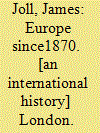

|
|
|
|
|
| Publication |
London, WeidenFeld and Nicolson, 1973.
|
| Description |
xiii, 541p.Hbk
|
| Standard Number |
0297765248
|
|
|
|
|
|
|
|
|
|
|
|
Copies: C:1/I:0,R:0,Q:0
Circulation
| Accession# | Call# | Current Location | Status | Policy | Location |
| 012662 | 940.287/JOL 012662 | Main | On Shelf | General | |
|
|
|
|
| 9 |
ID:
117914
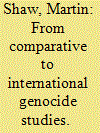

|
|
|
|
|
| Publication |
2012.
|
| Summary/Abstract |
Genocide is widely seen as a phenomenon of domestic politics, which becomes of international significance because it offends against international law. Hence there are as yet inadequate International Relations analyses of the production of genocide. This article challenges the idea of the domestic genesis of genocide, and critiques the corresponding approach of 'comparative genocide studies' which is dominant in the field. It analyses the emergence of more fruitful 'relational' and 'international' approaches in critical genocide studies, while identifying the limitations of their accounts of the 'international system'. As first steps towards an adequate international account, the article then explores questions of the international meaning and construction of genocidal relations, and of international relations as the context of genocide. It argues for a historical and sociological approach to the international relations of genocide, and examines 20th-century European genocide in this light. Arguing for a broader conception of this historical experience than is suggested by an exclusive focus on the Holocaust, the article offers an interpretation of genocide as increasingly endemic and systemic in international relations in the first half of the century. It concludes by arguing that this account offers a starting point, but not a model, for analyses of genocide in global international relations in the 21st century.
|
|
|
|
|
|
|
|
|
|
|
|
|
|
|
|
| 10 |
ID:
097730
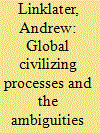

|
|
|
|
|
| Publication |
2010.
|
| Summary/Abstract |
Increased social power over the millennia has led to remarkable achievements in varied spheres of endeavour while introducing new possibilities for more destructive forms of harm over greater distances. Efforts to create moral frameworks to protect persons from senseless harm have been critical replies to the ambiguities of human interconnectedness. Over the millennia, societies have become entangled in global 'civilizing processes' such as the systems of communication that now encompass humanity as a whole, enabling different peoples to become better attuned to each other. Societies of states have immense significance for that long-term development. They have been arenas in which independent communities have discovered the prospects for, as well as the constraints on, agreements on norms that can be anchored in the most readily available points of solidarity between strangers - those vulnerabilities to mental and physical suffering that are shared by human beings everywhere. The recovery of 'universal history from a cosmopolitan point of view' can examine the contribution that international societies have made to global civilizing processes that harness such solidarities to restrain the human capacity to cause violent and non-violent harm to distant peoples. It can support the normative project of promoting global civilizing processes that employ unprecedented levels of collective power to reduce the tragic effects of the ambiguities that have accompanied long-term trends towards higher levels of human interconnectedness.
|
|
|
|
|
|
|
|
|
|
|
|
|
|
|
|
| 11 |
ID:
183861
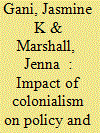

|
|
|
|
|
| Summary/Abstract |
Is there an academic–policy divide, and does that gap need to be bridged? For decades, International Relations (IR) scholars have reflected on their roles and responsibilities towards the ‘real world’, while policy-makers have often critiqued the detachment of academic research. In response, there have been increased calls for academics to descend from their ‘ivory tower’. However, the articles in this 100th anniversary special issue of International Affairs interrogate this so-called theory–policy divide and problematize the exchange of knowledge between academics and practitioners, highlighting the colonial underpinnings of their historical entanglements. In this introductory article we bring together the core arguments of the special issue contributions to delineate three prominent dynamics in the academic–practitioner nexus: the role of academia as a supplier of knowledge for colonial policies; the influence of imperial practice and policy-makers in shaping IR and academic knowledge production; and the contestation from academics and/or practitioners against racial hierarchies in knowledge production and policy-making. Confronting the exclusions, amnesias and denials of colonialism in the theory and practice of International Relations is the necessary first step in any process of repair towards a more just and viable politics.
|
|
|
|
|
|
|
|
|
|
|
|
|
|
|
|
| 12 |
ID:
164038
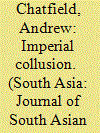

|
|
|
|
|
| Summary/Abstract |
During and immediately after World War I, Indian nationalism became subsumed into the overall American governmental efforts to cripple the activism of alleged subversives, radicals and anarchists. Indian nationalism was cast in a particularly negative light in the United States after British and American officials uncovered the Indo-German conspiracy of 1915. Using primary sources from American and British archives, I argue that through this ‘imperial collusion’ with the British, the United States spurned its Indian population and plainly let it be known that it would not support anti-colonialist independence movements. There were, however, American supporters of Indian nationalism in the United States who voiced their condemnation of British imperialism and disdain for American government repression and racism towards its Indian population. This article adds depth to South Asian studies through its transnational approach to anti-imperialism and anti-colonialism by revealing the shared solidarity among Indian and American anti-imperialists as they combatted the seemingly ubiquitous forces of the British and American empires from 1917 to 1920.
|
|
|
|
|
|
|
|
|
|
|
|
|
|
|
|
| 13 |
ID:
029979
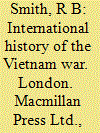

|
|
|
|
|
| Publication |
London, Macmillan Press Ltd., 1983.
|
| Description |
xiii, 301p.hbk
|
| Contents |
Vol. I: Revolution versus containment, 1955-61
|
| Standard Number |
0333242467
|
|
|
|
|
|
|
|
|
|
|
|
Copies: C:1/I:0,R:0,Q:0
Circulation
| Accession# | Call# | Current Location | Status | Policy | Location |
| 028175 | 959.7042/SMI 028175 | Main | On Shelf | General | |
|
|
|
|
| 14 |
ID:
165030
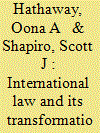

|
|
|
|
|
| Summary/Abstract |
The First World War was the last great war of what we have called the ‘old world order’—the legal regime that European states adopted in the seventeenth century and spent the next three centuries imposing on the rest of the globe. This order formed the basis of what scholars call ‘classical international law’. But this body of rules differed starkly from the ones that govern today: the old world order did not just sanction war, it relied on and rewarded it. States were permitted to wage war to right any legal wrong, and the right of the victors to extract territory and treasure from the losers was legally guaranteed. That all began to change when the nations of the world decided to outlaw war in the 1928 Kellogg–Briand treaty. As a result, the rules governing international behaviour have transformed radically—indeed, they are the polar opposite of what they once were. This article describes the decision to outlaw war and the transformation it unleashed in the world order generally, and in international law specifically. We argue that a simple but perplexing fact—that modern international law prohibits states from using force to enforce international law—is key to understanding international law and state behavior in the modern era.
|
|
|
|
|
|
|
|
|
|
|
|
|
|
|
|
| 15 |
ID:
129674
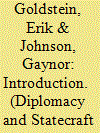

|
|
|
|
|
| Publication |
2014.
|
| Summary/Abstract |
This special issue of Diplomacy & Statecraft is in recognition of the contribution of Richard Langhorne to the fields of international history, diplomacy, and statecraft. He was a member of the founding Editorial Advisory Board of Diplomacy & Statecraft in 1988 and has served on that board for a quarter of a century, providing important guidance and notable contributions over many years. In his service to the scholarly world, beside his involvement with Diplomacy & Statecraft, Richard was one of the initial committee members of the British International History Group, of which he was the founding chairman and whose successful launch and in its early years he did much to ensure.
|
|
|
|
|
|
|
|
|
|
|
|
|
|
|
|
| 16 |
ID:
128995
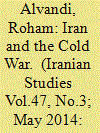

|
|
|
|
|
| Publication |
2014.
|
| Summary/Abstract |
For five decades, fromthe 1940s to the 1980s, Iran lived in the shadow of the Cold War between the United States and the Soviet Union. The country's geography, bordering both the USSR and the oil-rich Persian Gulf, meant that its territory and natural resources were of vital strategic importance in the ideological and material contest between the two superpowers, a global struggle over nothing less than "the soul of mankind."1 With the passage of nearly seventy years since the first Soviet-American confrontation in northern Iran, a growing number of scholars are examining the history of Iran's ColdWar, especially during the reign of Mohammad Reza Shah Pahlavi. Building on the work of earlier diplomatic historians, this emerging historiography looks both inward, at the impact of the Cold War on Iran, and outward, at the role of Iran in the Cold War far beyond its borders.2 This special issue showcases examples of this recent work by historians of Iran's Cold War, some of which was presented at the 2012 biannual conference of the International Society for Iranian Studies in Istanbul. Iran's importance in the Cold War is reflected in the rich literature on Iran's international history during the late Pahlavi period. The 1946 Iranian crisis marked the beginning of Iran's Cold War and the origins of the alliance between the United States and Iran, which continued until the fall of Mohammad Reza Shah in 1979.
|
|
|
|
|
|
|
|
|
|
|
|
|
|
|
|
| 17 |
ID:
131399
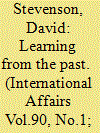

|
|
|
|
|
| Publication |
2014.
|
| Summary/Abstract |
This article is based on an inaugural lecture for the Stevenson Chair in International History, given at the London School of Economics (LSE) in October 2012. It re-examines the origins in Britain in the 1920s of the academic discipline of international history, focusing on the partnership between the LSE and Chatham House. It highlights the differences among the discipline's founders between broader and more tightly defined conceptions of its subject matter and scope, identified respectively with Arnold J. Toynbee on the one hand and with Harold Temperley and Charles Webster on the other. It also underlines the founders' agreement about international history's practical applicability, particularly for analysing and even for helping to prevent the outbreak of major wars. It explores the theme of 'learning from the past' by investigating the interconnection between the diplomatic crises of July-August 1914 and October 1962, reappraising John F. Kennedy's use of history to inform statesmanship. The article points to a recurrent pattern in the international conjunctures of 1914, 1939 and 1962 that may be replicating itself again today. It concludes that a knowledge and understanding of international history can indeed yield insights of practical value, though must be drawn on flexibly and with imagination.
|
|
|
|
|
|
|
|
|
|
|
|
|
|
|
|
| 18 |
ID:
170928
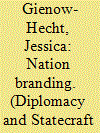

|
|
|
|
|
| Summary/Abstract |
This analysis suggests nation branding” as a useful category for the study of international relations and international history. In the past 15 years, entrepreneurs have invented nation branding as something new and modern, and governments the world over have signed up for cost-intensive campaigns to brand their countries’ images abroad. However, practices of nation branding have been around much longer. Indeed, the history of nation branding avant la lettre needs writing. That history provides a major encasement for the multitude of individual studies dedicated to soft power, public diplomacy, and cultural relations across time and space. This analysis looks first the at current experts and discourses on nation branding. Second, it sketches nation branding’s emergence from the end of the early modern period to the present. Third, it suggests a number of historical examples to inspire future research.
|
|
|
|
|
|
|
|
|
|
|
|
|
|
|
|
| 19 |
ID:
097804
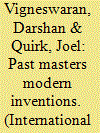

|
|
|
|
|
| Publication |
2010.
|
| Summary/Abstract |
In this article, we explore the relationship between past and present international relations (IR) scholarship, paying particular attention to the way in which various representations, interpretations and classifications of past works can collectively influence how modern scholars ask and answer questions. This serves two main purposes. On the one hand, we seek to contribute to a growing literature interrogating misleading and simplistic depictions of past authors and eras. On the other, we explore how the history of ideas can be utilized as a critical resource, which offers a compelling platform from which to refine and re-evaluate prevailing notions of the purposes of intellectual inquiry.
|
|
|
|
|
|
|
|
|
|
|
|
|
|
|
|
| 20 |
ID:
139824
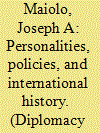

|
|
|
|
|
| Summary/Abstract |
This brief essay pays tribute to the contribution of Donald Cameron Watt (1928–2014) to the historiography of twentieth-century international history and the origins of the Second World War in Europe. It sets out his characteristic approach to the field, especially the emphasis he placed on the beliefs and perceptions of key decision-makers in the international system in explaining how and why events occurred the way they did. This essay suggests that Donald Watt’s approach to international history was shaped by the connexion he felt with the post-1919 founders of the field and by his own experiences in the immediate aftermath of the Second World War.
|
|
|
|
|
|
|
|
|
|
|
|
|
|
|
|
|
|
|
|
|